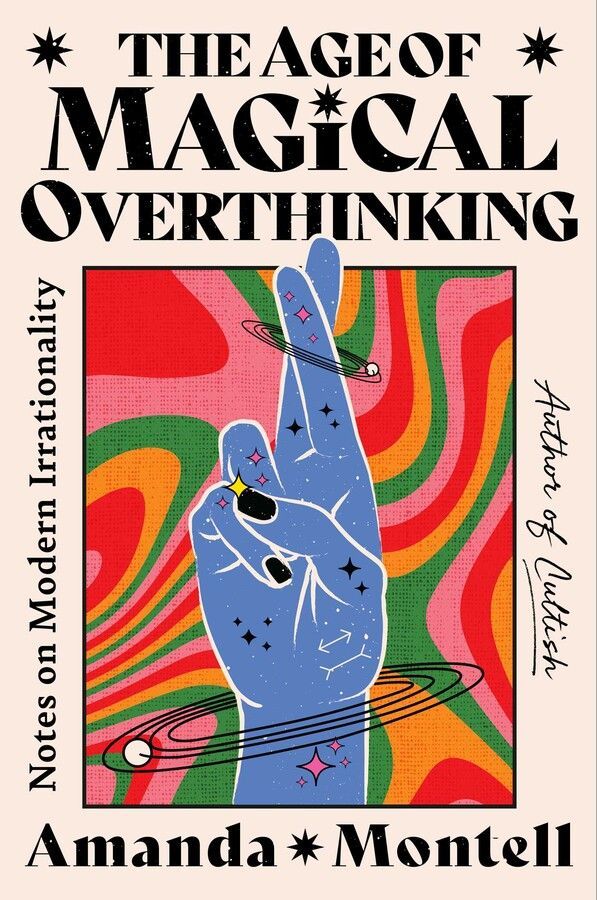Products You May Like
Amanda Montell knows the tricks you play on yourself. (She doesn’t judge. They’re her pet delusions, too.) Naming them—if not exactly shaming them—has become the author’s modus operandi, as she’s rebranded from begrudging beauty writer to buzzy pop linguist, sprinkling a bit of attention-catching glitter on the biases we might otherwise ignore. With her nonfiction books Wordslut, Cultish, and most recently, The Age of Magical Overthinking, and her popular podcast Sounds Like A Cult, Montell has opened broad avenues for her fans to track the race between language, psychology, and their own bizarre behaviors. But making such a career transition was more of a private endeavor, than her spiking follower count might suggest. “Becoming more skeptical of myself has actually been really healing over the past few years,” Montell tells me when we chat over Zoom in March.
The Age of Magical Overthinking, out this week from One Signal Publishers, employs a friendly, tongue-in-cheek (and gleefully millennial) tone to connect the dots between terms like the “halo effect” or “the recency illusion” and cultural touchstones such as Taylor Swift or mercury retrograde. Each section within the collection—subtitled “Notes on Modern Irrationality”—purports to explain how cognitive biases warp our actions. But many also contain a personal-essay bent, revealing Montell’s own struggles to explain herself. A particularly intimate chapter, “A Toxic Relationship Is Just a Cult of One,” details her painful seven-year-long courtship with an older man she refers to as “Mr. Backpack.” She considers the piece, which outlines the “sunk cost fallacy,” to be “the most personal piece of writing I’ve ever published, and that’s scary,” she says. “I had to put my vulnerability on the table in order to make my point.”
Montell is (and has been for some time) desperate to understand why the Information Age is also, as she’s coined it, the Age of Magical Overthinking, and why that disconnect seems to manifest again and again in her own life. “Why does more information only seem to be dividing us, making us feel worse, making things more confusing?” she asks, her upbeat demeanor only partly obscuring her frustration. “Why isn’t it helping us connect? Why isn’t it helping us discern facts more easily and use those facts to form our ideas?” In her pursuit of answers, she uncovered not only the language studies that led to her first books, Wordslut and Cultish, but also the cognitive processes that make language powerful.
A Baltimore transplant, Montell studied linguistics and creative writing at New York University, before following Mr. Backpack to Los Angeles in 2014, after which she got her first full-time writing job as an editor at Bikini.com. (“Listen,” she tells me, laughing, “I was not above it at all.”) She then moved into beauty writing at Byrdie for five years, during which she’d bleach her hair and line her eyes and tell herself, as she puts it, “‘I’m a mole. I’m in drag. I am just doing this for a paycheck.’” But, she continues, “I’m only human. So how could it not have an effect on the way that I made decisions and the way that I compared myself to other people?” That particular line of “overthinking” would later provide the foundation for her Magical Overthinking essay on “zero-sum bias.”
Still, Montell quit the beauty job (and, eventually, the hair bleach) as soon as she signed a deal to option and develop Wordslut for television. Ever since, she’s devoted her hours to building a small media universe around her quirky, digestible language-psychology writing. She dropped a Wordslut-inspired video series called “Amanda University” in chunks on Instagram; she launched the Sounds Like a Cult podcast to market her second book, Cultish, and studied the numbers as it became its own phenomenon; she dressed like a fairy, and a professor, and a pastiche of ’70s-style cult followers, all to stage technicolor photoshoots tied to book news and events; she started a Substack newsletter, “Magical Overthinkers,” and is planning a second podcast with the same title to launch in May. “Every week, I’m going to choose a buzzy subject that we, as a culture, can’t stop overthinking about—nostalgia, narcissism, monogamy, cannibalism, you name it—and every episode I’ll interview some charismatic expert about it, asking them questions that you might secretly spiral about late at night, but not feel comfortable asking,” Montell says.
As a self-proclaimed “theater kid,” Montell insists she has no qualms about “putting on a show, and a book is a show.” She takes pleasure in tweaking the dials of her own book marketing, and is eager to admit her “Sounds Like a Cult host persona is engineered.” But as someone purposefully immersed in the interplay between what we see, what we say, and how we act, she’s all too aware that social media is “a net negative psychologically, but a net positive professionally… When I give book marketing advice to other writers, I always just say, ‘Take on the social media tasks that make you not want to die.’” As we chat, she pauses to ask herself: “Will I ever reach a milestone in my career where I’m happy enough to be like, ‘Okay, I don’t need social media marketing anymore?’ I keep telling myself, if I reach this certain [point], I’m going offline. I’m moving to the fucking wilderness, and you’ll never hear from me again. But will anything be good enough for me? I don’t know, and that’s some shit I need to unpack with my own therapist.” Or, perhaps, with her next book.
Montell seems to possess the endless enthusiasm that might make the whole growing enterprise sustainable. She’s self-deprecating and introspective, but rarely subdued. (At this point, her energy is something of a running joke: “The first couple drafts of [Magical Overthinking] were what my editor described as ‘over-caffeinated,’” she says.) But she’s aware that her tirelessness has its own cognitive bias attached: She’s convinced she has to do “the fucking most in order for [her] book to be worth reading.” And she wants to keep writing. Maybe she has to keep writing. “Writing a book is stressful, of course, but when I’m not in that process, I do feel like I’m not as good at handling my thoughts and feelings,” she says.
As she embarks on The Age of Magical Overthinking book tour, which will feature a handful of zany variety shows as pit stops, she’s looking ahead to launching the new podcast, expanding her newsletter, and eventually starting a novel. But she doubts she’ll ever stray from the fundamental question that merges her work under a common banner: Why, pray tell, am I like this? “Every chapter [of Magical Overthinking], as I was writing it, I felt like, ‘This is the [cognitive bias] that applies to me the most,” Montell says. “A huge thing I wanted to do with the book was challenge myself to question my own rationalities as much as humanly possible, while developing compassion toward others’.”



